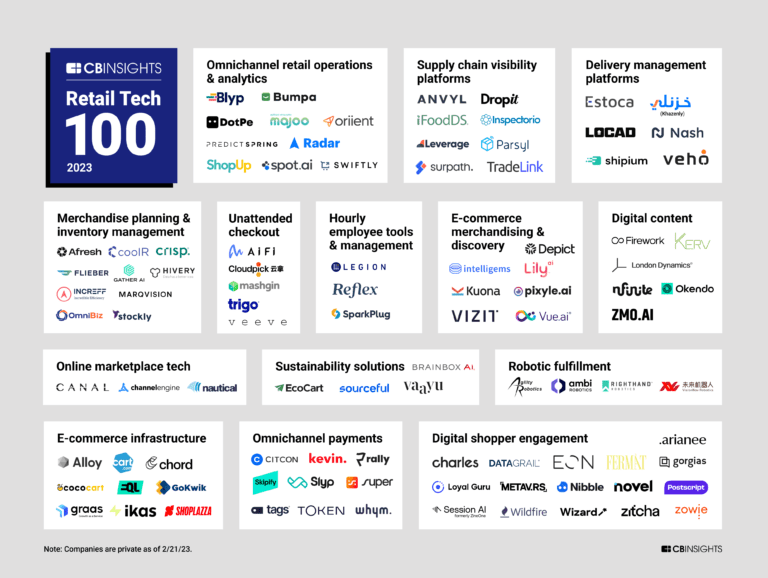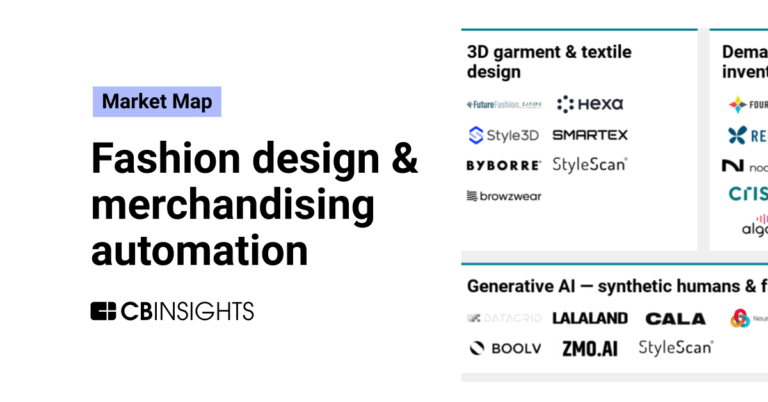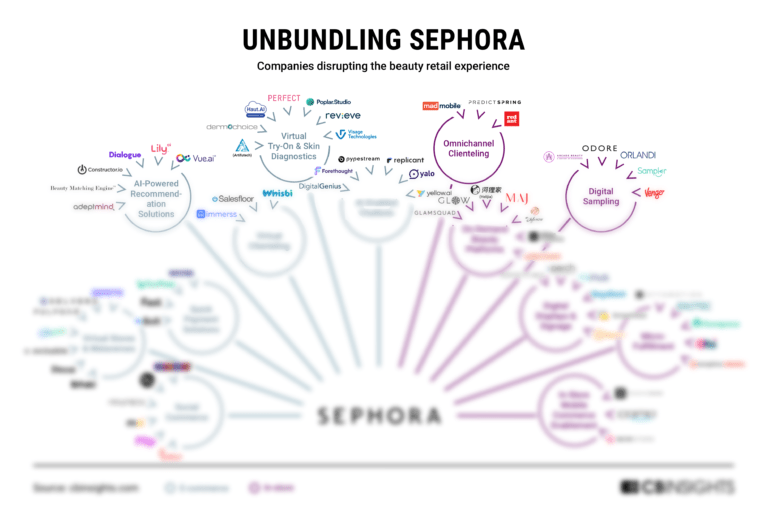
Lily AI
Founded Year
2015Stage
Series B - II | AliveTotal Raised
$51.9MLast Raised
$12.4M | 9 mos agoMosaic Score The Mosaic Score is an algorithm that measures the overall financial health and market potential of private companies.
+12 points in the past 30 days
About Lily AI
Lily AI focuses on e-commerce product discovery, operating in the retail technology sector. The company offers a platform that uses artificial intelligence (AI) to enhance product discovery by injecting customer-centric language into various retail processes, such as site search, recommendations, and demand forecasting. Lily AI primarily serves the ecommerce industry. It was founded in 2015 and is based in Mountain View, California.
Loading...
Lily AI's Product Videos


ESPs containing Lily AI
The ESP matrix leverages data and analyst insight to identify and rank leading companies in a given technology landscape.
The marketing automation personalization market is focused on providing personalized and relevant experiences to customers across various digital channels. Vendors in this market offer solutions that use AI and data analytics to create personalized content and messaging for each customer, resulting in increased engagement, conversion rates, and customer loyalty. The market includes a range of prod…
Lily AI named as Challenger among 15 other companies, including Oracle, Movable Ink, and MoEngage.
Lily AI's Products & Differentiators
Product Attributes Platform
Delivers transformative business impact at scale, not small improvements.
Loading...
Research containing Lily AI
Get data-driven expert analysis from the CB Insights Intelligence Unit.
CB Insights Intelligence Analysts have mentioned Lily AI in 3 CB Insights research briefs, most recently on Aug 21, 2023.

Mar 14, 2023 report
Retail Tech 100: The most promising retail tech startups of 2023Expert Collections containing Lily AI
Expert Collections are analyst-curated lists that highlight the companies you need to know in the most important technology spaces.
Lily AI is included in 8 Expert Collections, including E-Commerce.
E-Commerce
11,250 items
Companies that sell goods online (B2C), or enable the selling of goods online via tech solutions (B2B).
Market Research & Consumer Insights
734 items
This collection is comprised of companies using tech to better identify emerging trends and improve product development. It also includes companies helping brands and retailers conduct market research to learn about target shoppers, like their preferences, habits, and behaviors.
Artificial Intelligence
14,769 items
Companies developing artificial intelligence solutions, including cross-industry applications, industry-specific products, and AI infrastructure solutions.
Conference Exhibitors
5,302 items
Sales & Customer Service Tech
746 items
Companies offering technology-driven solutions for brands and retailers to enable customer service before, during, and after in-store and online shopping.
Targeted Marketing Tech
453 items
This Collection includes companies building technology that enables marketing teams to identify, reach, and engage with consumers seamlessly across channels.
Latest Lily AI News
Aug 26, 2024
Walmart Banks on Generative AI to Improve Customer, Seller Experiences Paul Weaver/SOPA Images via Getty Images Walmart wants to further amp its business with emerging technology. On its most recent earnings call, Doug McMillon, Walmart’s CEO, said the company has used artificial intelligence in a way that allows it to amp outcomes for consumers, sellers and internal employees. The company has been experimenting with AI for y e a r s , putting it ahead of many major industry brands and retailers. But the advent of generative AI several years ago has made the technology ultra buzzy throughout the industry. Walmart’s recent earnings call was no exception when it came to hype for generative AI, particularly as it continues to compete with Amazon—both for technological advancements and for market share. Product attribution has become one of the most widely discussed—and implemented—use cases for AI as retailers and brands consider how it could impact their businesses. Some companies, like Lily AI , have popped up to aid companies in attributing their products based on natural language queries consumers would use. So, for instance, rather than searching for “blue silk dress,” a consumer might search for “formal wedding guest dress.” McMillon said Walmart has used the technology to help it with clarity in its catalog, which has millions of SKUs in it at any given time. “We’ve used generative AI to improve our product catalogue. The quality of the data in our catalogue affects nearly everything we do, from helping customers find and buy what they’re looking for, to how we sort inventory in the network, to delivering orders,” he said. Related Stories Further information and attribution about products can help them appear in the results for a wider variety of applicable consumer queries. In sorting through the company’s data to make that a reality, McMillon said Walmart found immense benefit from using AI. “We’ve used multiple large language models to accurately create or improve over 850 million pieces of data in the catalog. Without the use of generative AI, this work would have required nearly 100 times the current head count to complete in the same amount of time. And for associates picking online orders, showing them high-quality images of product packaging helps them quickly find what they’re looking for.” Already, AI has started to influence the consumer journey at Walmart, particularly where e-commerce is concerned, McMillon said. In January, the company announced it would be going public with its AI-powered search tool, which enables consumers to use conversational language in the search bar or to ask questions in the search bar. Examples include “What should I wear to a fall wedding?” and “What do I need for a Super Bowl party at my apartment?” In June, the company announced it would build out a generative AI-powered shopping assistant, which could have in-depth conversations with consumers about a variety of products. McMillon said on last week’s call that the capabilities of that technology will only continue to be refined. Already, the company announced that it uses generative AI for review summarization and product comparisons, which McMillon did not mention on the call, but Walmart executives touted on social media in May. “Customers and members are already enjoying AI-powered search on our app and site, and now they’ll have even more help with a new shopping assistant that provides advice and ideas, answering questions like, ‘Which TV is best for watching sports?’ Looking ahead, the assistant will be able to respond with more specific follow-up questions, like, ‘How’s the lighting in the room where you’ll place the TV?’” Though some of Walmart’s focus with AI technology up until this point has been targeted at the end consumer, the company’s business model is unique in that it has another customer: its marketplace sellers. McMillon said the retail giant continues to evaluate how it can use generative AI to help answer questions for sellers. “As we work to do all we can to help our sellers grow their businesses, we’re testing a new experience to select U.S.-based sellers that allows them to ask us anything. We want our sellers focused on selling, so the more we can make it a seamless experience, the better. The new assistant will quickly summarize and provide the seller with succinct answers without them having to sort through long articles or other materials,” he said. McMillon closed out his remarks on the earnings call by pontificating on how the company plans to move forward with technology as it iterates rapidly. It comes as no surprise that the company, which has significantly improved its technology prowess in past years, has plans to continue moving in that direction. In addition to its generative AI experiments, Walmart uses legacy AI systems to build its proprietary route optimization software, to handle autonomous forklifts in its distribution centers and more. “The use cases for this technology are wide ranging and affect nearly all parts of our business, and we’ll continue to experiment and deploy AI and generative AI applications globally,” he said. “Today’s Walmart is different. We are people-led and tech-powered. We put ourselves in a position where we can continue to grow because we’re serving people however they want to be served. We can grow profit faster than sales while investing in our associates and lowering prices for customers and members, and we can grow ROI as we make the right capital investments and grow profitability.” Read More About
Lily AI Frequently Asked Questions (FAQ)
When was Lily AI founded?
Lily AI was founded in 2015.
Where is Lily AI's headquarters?
Lily AI's headquarters is located at 800 West El Camino Real, Mountain View.
What is Lily AI's latest funding round?
Lily AI's latest funding round is Series B - II.
How much did Lily AI raise?
Lily AI raised a total of $51.9M.
Who are the investors of Lily AI?
Investors of Lily AI include New Enterprise Associates, Canaan Partners, Conductive Ventures, Counterpart Ventures, Transform Capital and 19 more.
Who are Lily AI's competitors?
Competitors of Lily AI include FindMine, Wide Eyes Technologies, Mad Street Den, EDITED, Syte and 7 more.
What products does Lily AI offer?
Lily AI's products include Product Attributes Platform and 3 more.
Who are Lily AI's customers?
Customers of Lily AI include thredUP.
Loading...
Compare Lily AI to Competitors

Syte is a technology company specializing in AI-powered visual search and product discovery solutions for the eCommerce sector. The company offers a platform that enhances online shopping experiences by providing visual AI tools for search, personalized recommendations, and automated product tagging. Syte primarily serves the fashion, home decor, and jewelry industries with its product discovery platform. It was founded in 2015 and is based in Tel Aviv, Israel.

Mad Street Den operates as a company specializing in artificial intelligence with a focus on computer vision-driven artificial intelligence (AI) across various industries. Its main offerings include an enterprise AI platform known as Vue.ai, which provides AI-enabled applications that facilitate data-driven decision-making and enhance productivity for large enterprises. Vue.ai serves multiple sectors including retail, finance, insurance, logistics, and healthcare. It was founded in 2016 and is based in Redwood City, California.
Streamoid is a company that focuses on artificial intelligence technology in the fashion retail industry. The company offers services such as automated cataloging, personalized customer experiences, and retail intelligence, all powered by AI. Their solutions are designed to simplify the transformation to omni-channel retail, digitizing the journey from product to consumer. It is based in Bengaluru, India.
OMNIOUS.AI is a company focused on revolutionizing e-commerce through the application of advanced artificial intelligence technology. The company offers a range of AI-powered services designed to enhance the online shopping experience, including automated product tagging, image moderation, and personalized product recommendations. These services aim to streamline the buyer's journey, improve product discovery, and boost purchase conversions. It was founded in 2015 and is based in Seoul, South Korea.
Yosh.AI specializes in artificial intelligence, focusing on automation and conversational AI within the retail, banking, insurance, and tourism sectors. The company offers a suite of AI products, including chatbots, voice assistants, and omnichannel solutions, designed to automate customer service and enhance user engagement through personalized interactions. Yosh.AI's products are tailored to streamline operations for enterprise contact centers and improve the efficiency of employee workflows. It was founded in 2017 and is based in Warsaw, Poland.
Nyris specializes in visual search technologies within the AI and machine learning sector. The company offers custom search engines that enable users to find products, spare parts, and components using images, keywords, codes, or 3D CAD files. Nyris primarily serves sectors that require efficient spare parts management and enhanced search capabilities for industry and eCommerce. It was founded in 2015 and is based in Berlin, Germany.
Loading...

